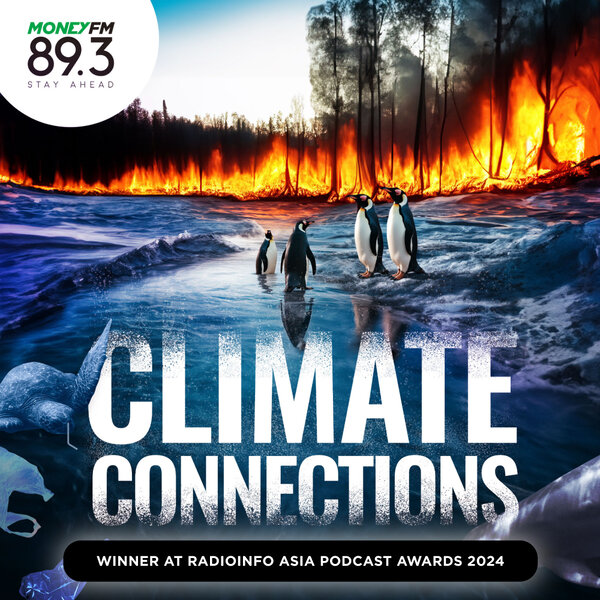
Climate Connections
About
A special segment on Money FM 89.3's Breakfast Show that brings you on an exclusive audio journey to the ends of the world, covering in-depth environment, natural history and climate change stories that intertwine with human life on Earth.
DEC 20, 2024
20/12/24 - Climate Connections: Mission Blue - "Her Deepness" Dr Sylvia Earle's Lifelong Quest To Turn The Tides For Our Blue Planet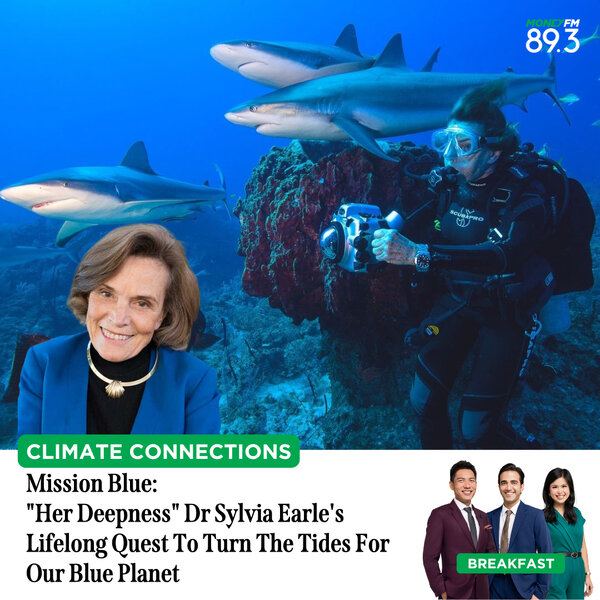
The ocean holds clues to past civilisations and cultures, provides a rich resource for new medicines and treatments, but more importantly, is home to millions of undiscovered species. Ocean scientists around the world have been seeking to unlock its secrets, but only just over 20% of the ocean floor is mapped. What lives, feeds and breeds down there in the icy depths remains a huge mystery.
Large-scale extraction of ocean species like cod, herring, tuna, swordfish and halibut, has brought the collapse of these wild populations by about 90% in just the last few decades.
But, a new wave of understanding about why the ocean matters is bringing a glimmer of hope.
On this episode of Climate Connections, Dr Sylvia Earle, Founder of Mission Blue & National Geographic Society Explorer in Residence - who has dedicated her life to explore, study and protect the oceans - shares first-hand insights on her dives into the deep blue and why exploration is an important step in educating the masses.
She also dives into what she’s hoping to achieve when she leads Ocean Geographic’s BIG ACE Expedition to ground-zero of the climate crisis: the Arctic, in line with her 90th birthday next year (2025).
Special thanks to Ocean Geographic.
Feature produced and edited by: Yeo Kai Ting (ykaiting@sph.com.sg)
Voiced by: Emaad Akhtar
Photo credits: Michael Aw / Ocean Geographic
Music credits: pixabay & its talented community of contributors
|
|
|
|
17:37
|
DEC 13, 2024
13/12/24 - Climate Connections: Are you underconsuming what you have?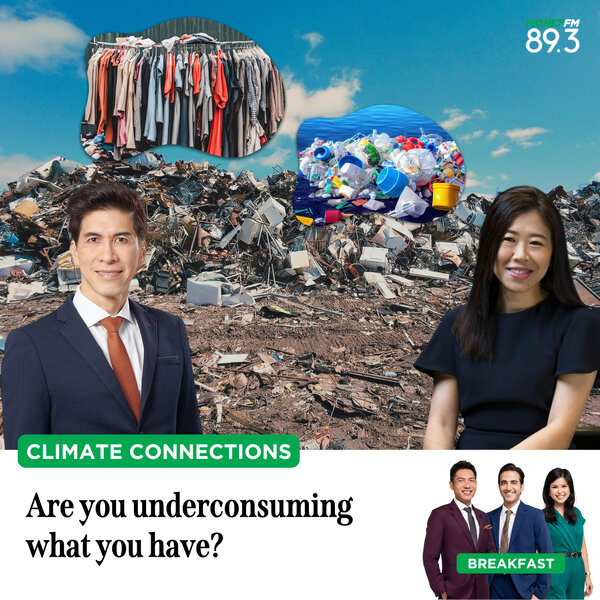
Do you use your things for what they are worth before throwing it out?
With a lot more focus placed on fighting the effects of climate change, the pace at which we’re using our planet’s resources has also come into the spotlight. According to the World Economic Forum, high-income countries use about six times more materials per capita and are responsible for 10 times more climate impacts per capita than low-income countries.
So, how can overconsumption be curbed more effectively? And are you underconsuming what you have?
On this episode of Climate Connections, Cheang Kok Chung, Executive Director, Singapore Environment Council and Michelle Lee, Associate Professor of Marketing (Education), Lee Kong Chian School of Business, Singapore Management University weigh in on how attitudes towards consumption are changing, and what consumers and businesses can do to play their part.
Feature produced and edited by: Yeo Kai Ting (ykaiting@sph.com.sg)
Voiced by: Emaad Akhtar
Photo credits: Earth.com, pixabay & its talented community of contributors
Music credits: pixabay & its talented community of contributors
|
|
|
|
13:07
|
DEC 6, 2024
06/12/24 - Climate Connections: Vulture Restaurants - Providing a lifeline for critically endangered vultures in Cambodia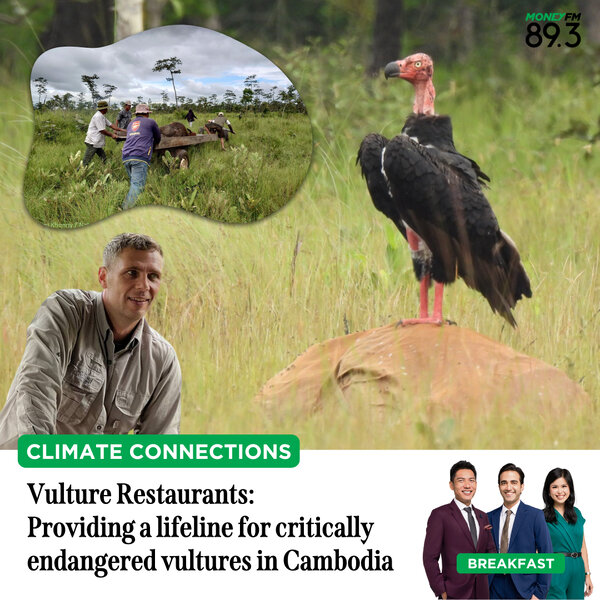
Vultures are often misunderstood and feared as they are often pictured tearing the remains from rotting carcasses. But as nature’s critical clean-up crew, vultures play a vital role in maintaining the delicate balance of ecosystems and are intrinsically linked to human health. Evolved to be scavengers, they curb the spread of dangerous diseases like anthrax and cholera by consuming fresh carcasses riddled with potential pathogens and bacteria.
Poisoned, poached, electrocuted and edged out of their habitat, vultures are no safer above ground than on it. These highly intelligent birds are treading a very thin line between existence and extinction.
However, the Cambodia Vulture Working Group’s recent report reveals significant progress in the conservation of three Critically Endangered vulture species: the White-rumped Vulture, Slender-billed Vulture, and Red-headed Vulture. In June 2023, the Minimum Population Estimate was recorded at 132 vultures across the three species, marking a stabilising trend after years of decline.
On this episode of Climate Connections, Oliver Gray-Read, Technical Advisor at NatureLife Cambodia,who has vultures deeply intertwined into the work he does, particularly in Cambodia - where the group has re-introduced the “vulture restaurant” initiative, which helps provide Cambodia’s vulture population with supplementary food to mitigate food shortages and allows for accurate population monitoring.
Feature produced and edited by: Yeo Kai Ting (ykaiting@sph.com.sg)
Voiced by: Emaad Akhtar
Photo credits: NatureLife Cambodia
Music credits: pixabay & its talented community of contributors
|
|
|
|
12:49
|
NOV 29, 2024
29/11/24 - Climate Connections: Cooking up a storm - How climate change is rewriting the rules of extreme storms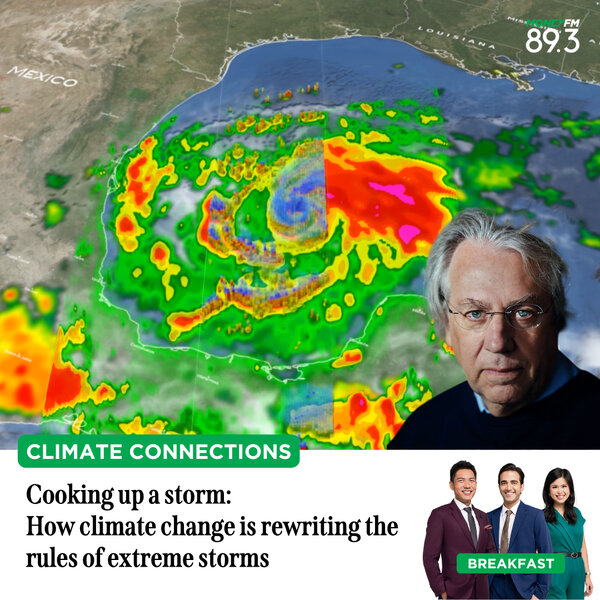
Every Atlantic hurricane that formed this year had higher wind speeds because of climate change. In fact, scientists found that the extra juice from warmer-than-average ocean temperatures pushed seven storms at least one category higher than they would have been without the influence of climate change.
That’s according to a recent study by researchers from the climate science and communications nonprofit Climate Central, warning of the dangers of intensifying hurricanes in a warmer world.
On this episode of Climate Connections, Professor of Atmospheric Science at the MIT Joint Program on the Science and Policy of Global Change, Kerry Emanuel, who pioneered potential intensity measurements shares his insights on storm strength that he predicted would happen over 30 years ago, and worries that scientists like him have.
Feature produced and edited by: Yeo Kai Ting (ykaiting@sph.com.sg)
Voiced by: Emaad Akhtar
Photo credits: NASA
Music credits: pixabay & its talented community of contributors
|
|
|
|
11:48
|
NOV 22, 2024
22/11/24 - Climate Connections: Lifeless Coral Reefs - 3D-printed good old-fashioned terracotta tiles to the rescue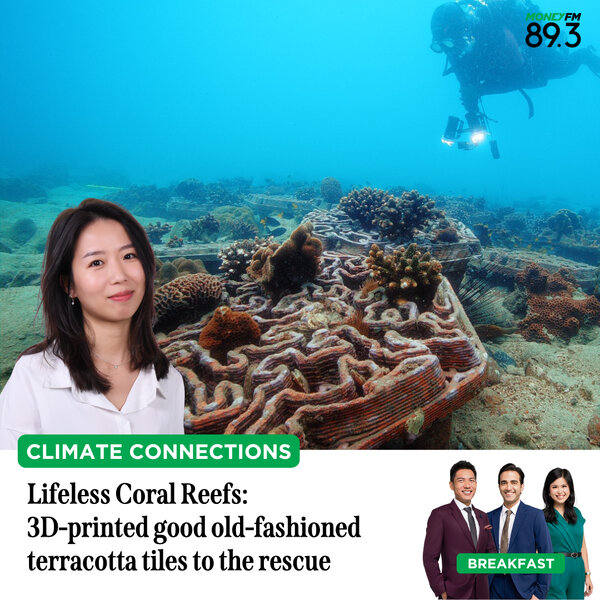
Coral reefs have long been regarded as one of the earliest and most significant ecological casualties of global warming. And as ocean temperatures continue to rise, mass bleaching and die-offs have gone from being rare to a somewhat regular occurrence.
Aside from climatic changes, human activities are no doubt damaging reefs beyond repair. Overfishing, pollution and coastal development are at the top of the list of chronic stressors. And meanwhile, reefs are also dredged or sandblasted for their limestone or to improve access and navigational safety in some areas.
On this episode of Climate Connections, Vriko Yu, CEO of Archireef shares her personal story of witnessing the disappearance of a small patch of coral community in just two months during her research project and how that led to the founding of her climate tech venture that’s working to restore fragile marine ecosystems by using 3D printing technology and some good old-fashioned terracotta.
Archireef, which was founded in 2020, made the Forbes 100 To Watch List in 2023. Vriko was also recognised as a Top Innovator at the 2023 World Economic Forum in Davos.
Feature produced and edited by: Yeo Kai Ting (ykaiting@sph.com.sg)
Voiced by: Audrey Siek
Photo credits: Archireef
Music credits: pixabay & its talented community of contributors
|
|
|
|
13:59
|
NOV 15, 2024
15/11/24 - Climate Connections: Will the ‘new collective quantified goal’ on climate finance be inclusive enough?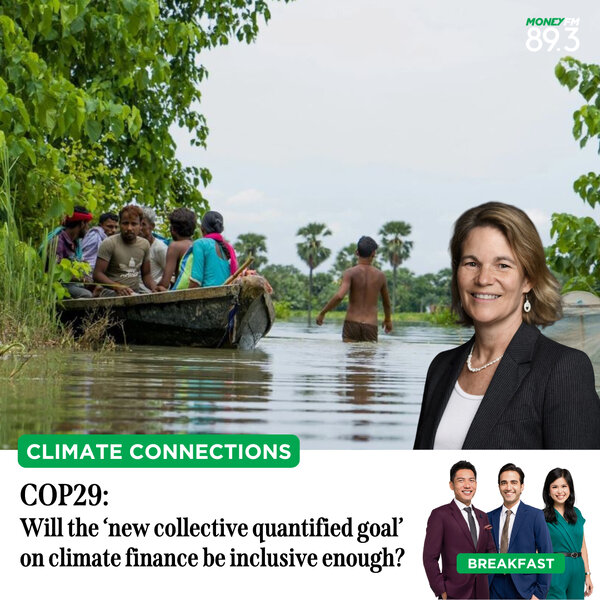
2024 is "virtually certain" to be the hottest on record. In recent months, the world has seen back-to-back hurricanes, catastrophic flooding, devastating typhoons and severe drought.
It is against this backdrop that global leaders gather at the COP29 UN climate summit in Baku, Azerbaijan, where a draft text of the new climate finance target was published. The finance agreement - also known as the New Collective Quantified Goal - would apply when the current US$100bn per annum target ends in 2025, and will be crucial for scaling up finance for climate action around the world.
With more than a week of talks ahead, the final outcome is still uncertain. However, the text contains many options still under consideration, as world leaders and negotiators work out a new financial target to support developing countries in their climate actions post-2025.
On this episode of Climate Connections, Sophie Sirtaine, CEO of CGAP - an international partnership housed in the World Bank Group, dedicated to promoting inclusive financial ecosystems - weighs in on what’s at stake.
Feature produced and edited by: Yeo Kai Ting (ykaiting@sph.com.sg)
Voiced by: Audrey Siek
Photo credits: Unsplash/Atul Pandey
Music credits: pixabay & its talented community of contributors
|
|
|
|
13:58
|
NOV 8, 2024
08/11/24 - Climate Connections: Unlocking Earth's Superhot Geothermal Energy in the Taupō Volcanic Zone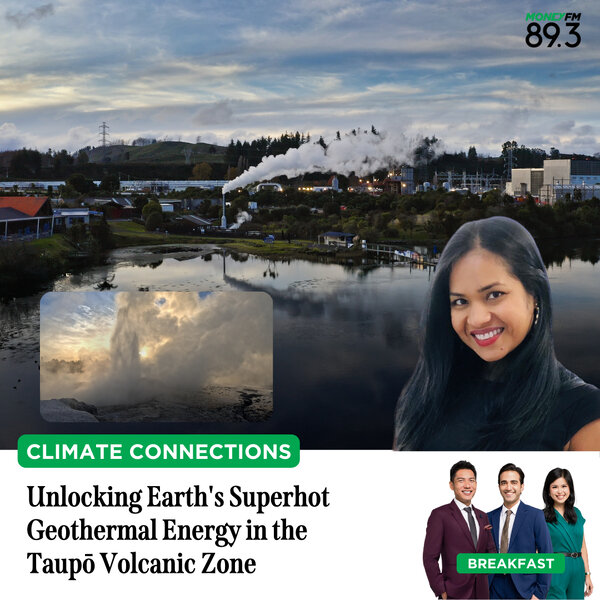
Until now, geologists have been divided as to whether this superdeep, superhot resource can be tapped.
Rock under high temperature and pressures - more than 373 degrees Celsius and 220 bars of pressure - is ductile, or gooey, as opposed to a smashable stone from your backyard.
So far, data shows that rock that fractures at superhot conditions can be ten times more permeable than rock that fractures at conditions closer to the Earth’s surface, and can also deform more readily.
Scientists have found that in the Taupō Volcanic Zone, supercritical conditions are as shallow as 4 km, making it one of the rare places in the world where supercritical development is both accessible and technically feasible. So far, only Iceland, Japan, the United States and Kenya have successfully drilled superhot wells.
On today’s Climate Connections, Sheena Thomas, Interim General Manager Research Strategy and Partnership from GNS Science shares her insights on the economic potential and viability of superhot geothermal in New Zealand, and why proper environmental impact studies and collaborations with local indigenous Maori communities are absolutely critical in ensuring minimal environmental impact. She’s also a speaker at the Singapore International Energy Week this year.
GNS Science is leading a multi-year research programme 'Geothermal: The Next Generation’ - to investigate New Zealand’s ‘supercritical’ (high temperature/superhot) geothermal conditions and evaluating the economic opportunity for supercritical geothermal heat and electricity generation in New Zealand.
Feature produced and edited by: Yeo Kai Ting (ykaiting@sph.com.sg)
Voiced by: Audrey Siek
Photo credits: GNS Science
Music credits: pixabay & its talented community of contributors
|
|
|
|
12:24
|
NOV 1, 2024
01/11/24 - Climate Connections: Tiny matters - Using acoustic sound waves to model how algae affects climate, human health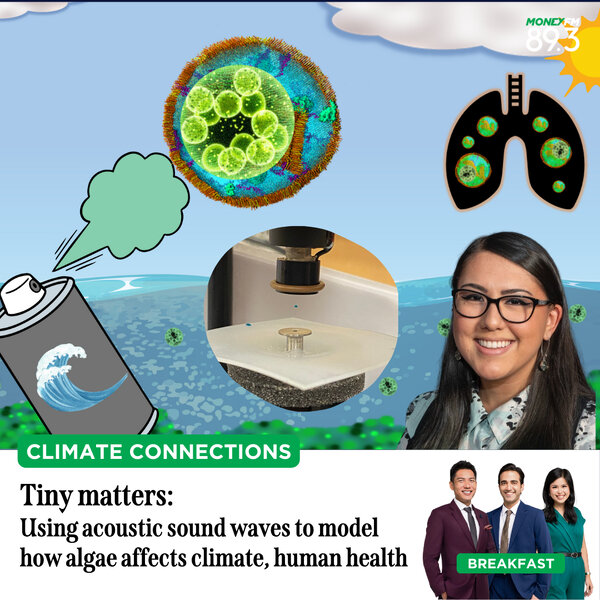
Algae are microscopic organisms that live in aquatic habitats and they use photosynthesis to produce energy from sunlight, just like plants. So far, there are over 50,000 species of living algae documented currently. And one thing that people sometimes forget is that algae are the base of many food webs and are an integral part of a healthy aquatic ecosystem.
But, algae can also grow out of control if the water around them contains too many nutrients, resulting in harmful algal blooms. And did you know that toxins from these harmful algal blooms could get kicked up into the air as airborne algae?
With the focus on climate change growing, scientists are continuing to document the effects of climate change on algae, and how airborne algae in turn interact with our environment.
On this episode of Climate Connections, Mickey Rogers, Pauling Fellow and Chemist, Pacific Northwest National Laboratory, who is researching airborne algae and its impact on atmospheric processing, shares her insights. She's currently also developing new methods of aerosol generation and online gas flux monitoring of biological cells including acoustic levitation of small particles.
Feature produced and edited by: Yeo Kai Ting (ykaiting@sph.com.sg)
Voiced by: Audrey Siek
Photo credits: Mickey Rogers / Pacific Northwest National Laboratory
Music credits: pixabay & its talented community of contributors
|
|
|
|
13:03
|
OCT 25, 2024
25/10/24 - Climate Connections: A scrap revolution - Challenges behind pushing the needle on industrial recycling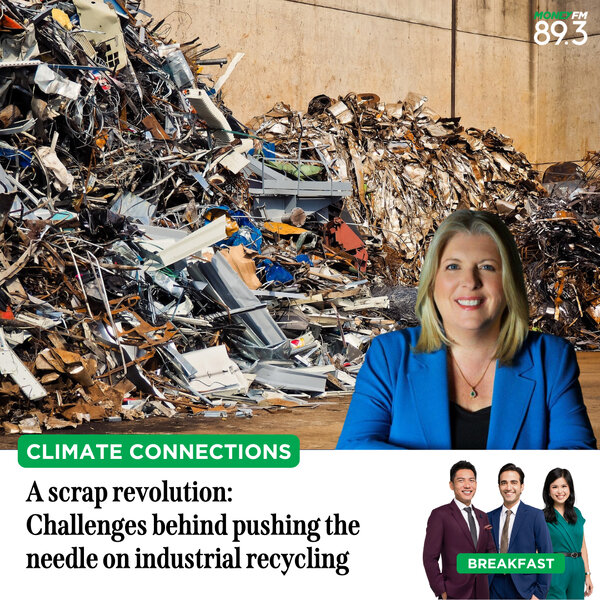
Industrial waste makes up at least 50% of waste generated globally. And much of that waste is the result of poor quality products from manufacturing processes, as well as the sheer complexity of manufacturing and supply chain management.
As consumer awareness about the environmental impacts of waste increases, recycling is expected to grow considerably in the coming years. By 2032, the global waste recycling services market is forecast to have surpassed a value of US$90 billion, registering a compound annual growth rate of 4.7 percent during the forecast period 2023 to 2032.
But cost is often an issue. So, what can be done to scale up recycling within industries?
On this episode of Climate Connections, Susie Burrage, President, Bureau of International Recycling, who will be actively involved in the World Recycling Convention, held in Singapore from 28th to 29th October, shares her perspectives of being a fourth-generation recycler.
Feature produced and edited by: Yeo Kai Ting (ykaiting@sph.com.sg)
Voiced by: Audrey Siek
Photo & music credits: pixabay & its talented community of contributors
|
|
|
|
13:00
|
OCT 18, 2024
18/10/24 - Climate Connections: Earth In Focus - Tapping On The Power Of Thought-Provoking Nature Films & Community For Conservation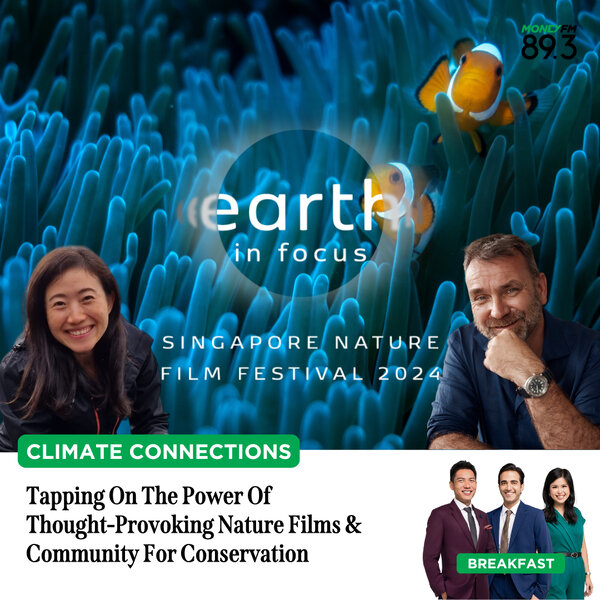
Nature films tell the stories of the world's flora, fauna, and landscapes - often a journey into the secret lives of what exists around us. These stunning visual tales show us how we are interconnected with nature in many ways. This, in turn, allows us to better understand the current conversations about climate change, sustainability and biodiversity, and put us in a better position to be agents of hope and change.
That’s exactly what the inaugural ‘Earth in Focus’ Singapore Nature Film Festival 2024 hopes to achieve. Running from 1st to 3rd November this year, the festival will showcase local and international films, photography and ecological art exhibitions, as well as workshops run by conservation NGOs - covering a wide range of conservation topics, from ocean and land conservation to water scarcity and technology for conservation.
On this episode of Climate Connections, Daphne Ong, Conservationist & Festival Director of Earth In Focus, and Andy Ridley, CEO of Citizens of the Reef & Co-founder, Earth Hour share their insights ahead of the festival.
Find out more about Earth In Focus and register for film screenings and workshops here: https://www.earthinfocus.co/festival-happenings
Feature produced and edited by: Yeo Kai Ting (ykaiting@sph.com.sg)
Voiced by: Audrey Siek
Photo credits: Earth In Focus
Music credits: pixabay & its talented community of contributors
|
|
|
|
12:41
|







